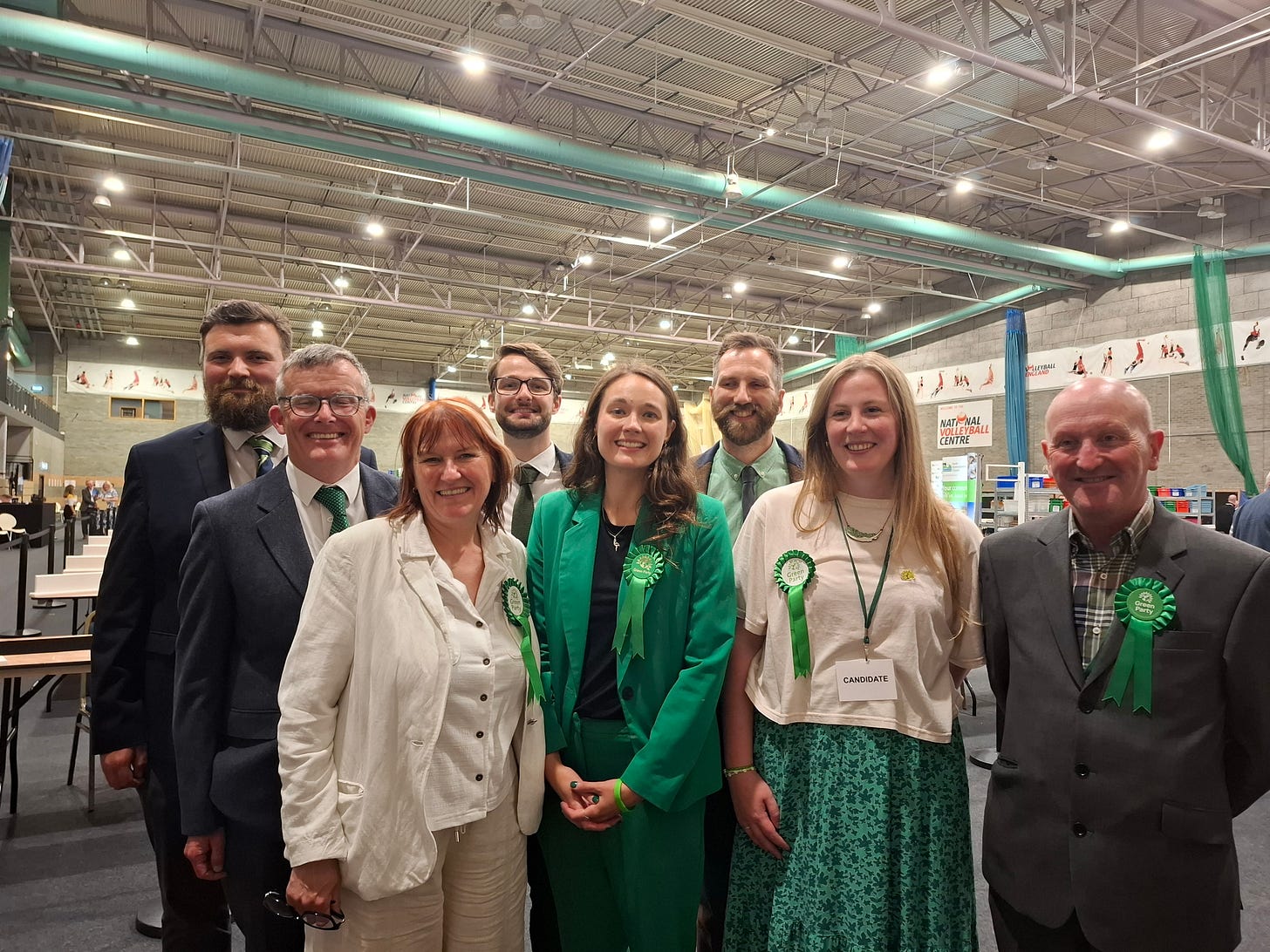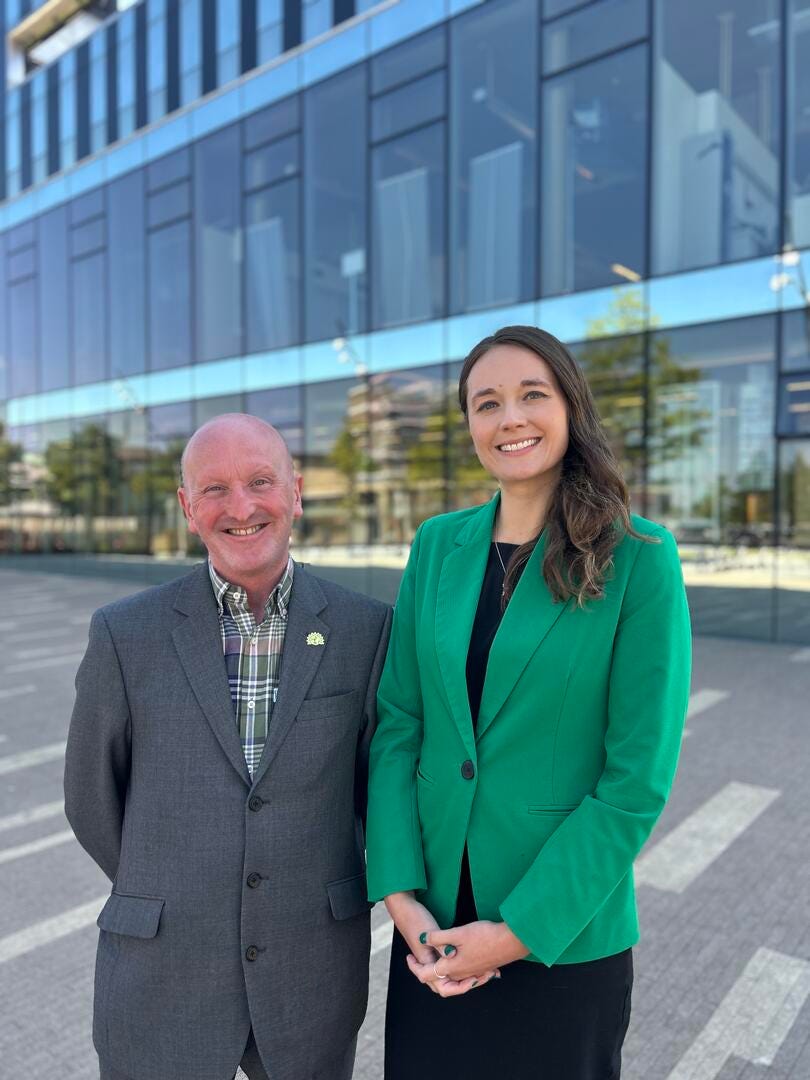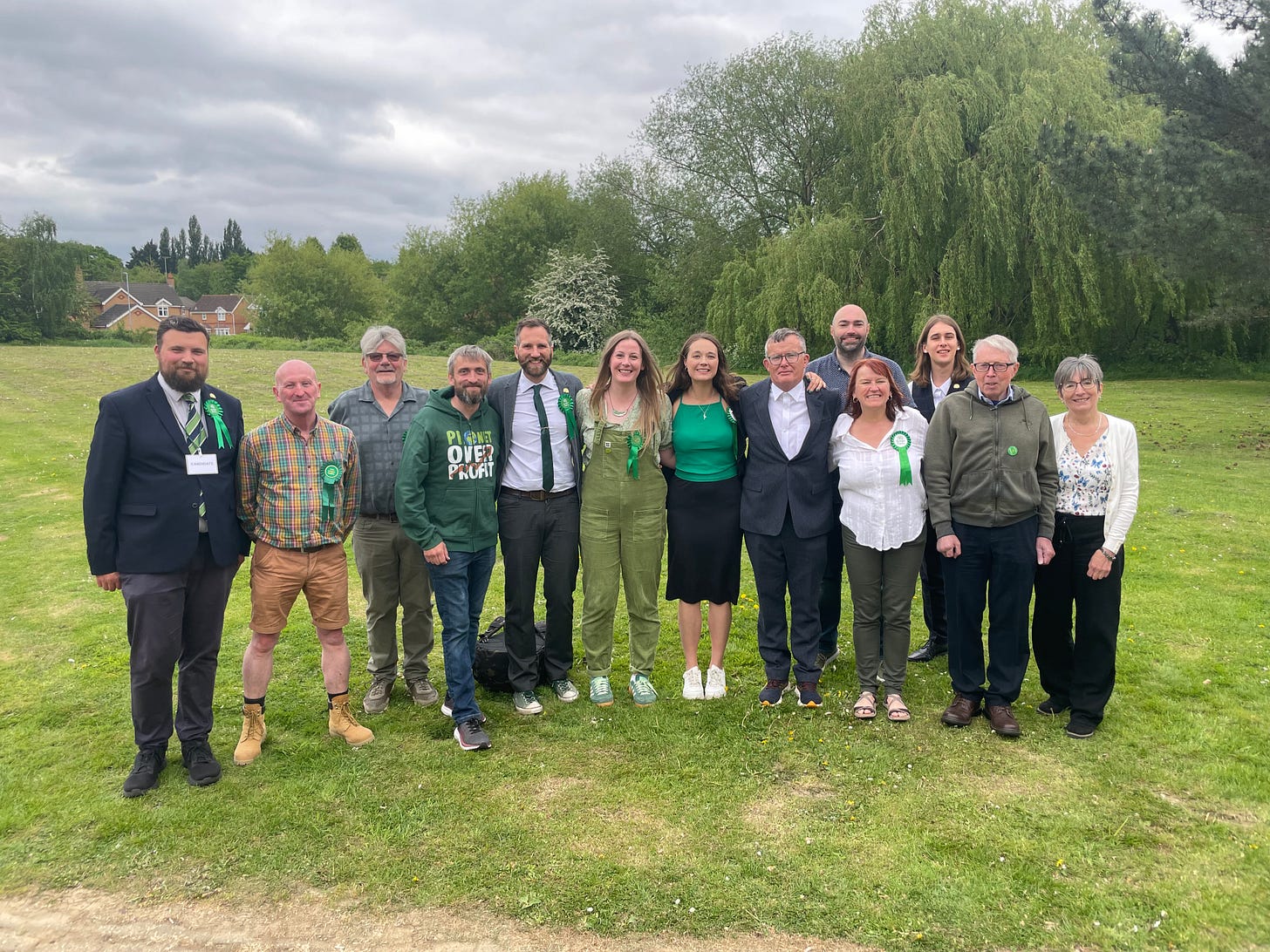The ambitions of the Green Party
NN Journal sat down with leader of the Kettering Green Party Emily Fedorowycz to find out how a group of local activists has turned the Green party into a political force
By Sarah Ward
“We need somebody on the inside, it’s not moving quick enough. These guys don’t seem to be listening.”
Those were the words of Dez Dell in 2019 to his Kettering Eco Group colleagues after enduring another episode of turning up to the Conservative led Kettering Borough Council and not being heard.
Activists for several years, friends Emily Fedorowycz and Dez Dell had been involved in voluntary work with the homeless and litter picking in Kettering before co-founding the Kettering Eco Group.
Then when popular Kettering leisure space Weekly Hall Wood came under threat during the 2020 lockdown, Dez Dell became the lead campaigner in a fight against local landowner the Duke of Buccleuch’s development plans, galvansing thousands in the town to pick up their protest placards and dip into their pockets to raise funds to fight the warehouse scheme.
The battle raised Dez’s profile and a year later in the 2021 unitary elections, he, Emily and Green party colleague Sarah Tubbs were the first Green councillors elected in Northamptonshire.
Four years on they have continued their success, winning eight council seats in this month’s North unitary election and also taking control of Kettering Town Council - one lone Conservative remaining on the authority, which has been under Tory control for many years.
But with Reform UK taking charge of the unitary council, the Green Party face a fresh challenge, especially with the national party’s stance on climate.
NN Journal met Emily in a Kettering cafe two weeks on from those elections.
A creative writing graduate from the prestigious University of East Anglia (notable alumni include Kashuo Ishiguro and Ian McEwan) Emily grew up in a Conservative supporting household and her own first political inspiration was the Liberal Democrat local councillor the Rev Andrew Dutton, who was connected to Bishop Stopford School she attended.
It was at university she became aware that her views were mostly aligned with the Green Party after doing a political quiz. She joined the party in 2020.
She became head of the Kettering Green Alliance when elected in 2021 and will now lead the group of eight councillors on the unitary.
Driven by huge amounts of energy - while campaigning she also managed to help organise a large scale clean up of Kettering town centre - she is keen the local party now makes its strengthened numbers count.
She says of the election day:
“It was such a wonderful day and I thought I would be full of elation, but the weight of responsibility, I feel that very heavily. We have a lot we want to do and I want to make sure people know that voting green does make a difference.
“We have heard so many people say when they vote it doesn't make a difference, and I want people to see a difference. We have to drive forward in the next six months and that urgency is really felt by me.”
Town Council
The town council is where the green flavour of politics in action will be able to be seen most clearly. The 19 councillors have total control of the authority and so will be unchecked in their plans.
The leader has been chosen as Mayor Ben Jameson, but no doubt Emily will be a driving force in what the collective council does. Under its Conservative administration the council had voted down every motion the Green’s had put forward, but Emily says now there are no blockers to their plans.
She says:
“We don’t have a big budget, but what we do have is the ability to empower other organisations and community groups to access funding. We can also apply for funding as a town council. We want to be ambitious, we don’t want to take on more than we can chew, but there is so much opportunity for the council to be a catalyst for action. Even something as small as street parties.
“Just make it easy for people to enjoy their communities. We can help identify some of the gaps and show people the way a little bit.”
Rebrand needed?
She thinks many have the wrong idea of what the Green Party is and says for her it is about people and coming up with practical solutions to problems.
She says:
“I think we need a rebrand maybe. Because Green is not in my view what it stands for anymore. Environment should be embedded within everybody’s manifestos, that should not be something that sets us apart.
“We are the people for local business and fiscal sense.”
Within the unitary the Green group already has ideas about things they want to suggest to help the authority bring in more funding and also make savings in areas which are hugely overspending.
She says:
“There’s an appreciation of the fact that Reform say they want to work cross party and that has previously been an issue with the Conservatives.
“The atmosphere within the council has been very bad. We tried to shake it up. Now it has had the biggest shake up it could possibly get and we will have to see what comes with that.”
Having sat on the unitary for four years already she is aware of where the council has been lacking.
She says:
“One of the big challenges is we have not been unlocking funding. Having oven ready bids is something we need to get better at. I have in the past asked for for a specific bid writer on the council - it takes a lot of time and officers are really stretched.
“There are areas we have already identified for savings - such as home to school transport. It has been identified as spending too much, we know it is a complex one to solve, but we know that there are kids that are travelling to school on their own that don’t need to be; it is causing a lot of congestion.
“I’ve been looking at other councils and how they have been saving money on it. We really do need to support SEN families, but also look at how we can do things more efficiently and effectively.”
Non negotiable
The Green Party gained 44 per cent of all the votes cast in Kettering (9,982 of the 22,773 votes), knocking the insurgent Reform UK into second place in each of the five wards it won. Emily says that result shows the strength of support in Kettering for climate change policy and gives her team a mandate to push for action.
She says:
“We will not be negotiating on climate. What I want them to think about is are they representing their people or are they representing their party? My feeling from talking to Reform is they want to represent the local people and if that is the case, then they need to follow through on that.
“People will be looking to us to challenge them. We will be incredibly on it.”
In 2021 the Conservatives pledged £1m in North Northants for green initiatives, but much of that money has not been spent and Emily fears the pot will now be scrapped.
She says:
“We will be a political friend if we can collaborate, but if they [Reform] go down this road we will be fighting them all the way and they will have a really tough four years. It is their call basically.
“We are the opposition to Reform. The Conservatives are the largest group, but some of the Reform are ex-Conservatives, so we know the line between them is quite blurred. So people will be looking to us to challenge them.”
Since our interview the Reform UK leader on the North unitary Martin Griffiths has said his party has concerns over the net zero targets because ‘they are making everybody poorer’.
So it looks like the Green’s have the first fight on their hands. We’ll all have to watch and see how it plays out.







Cllr. Martin Griffith, Leader of Reform, says net zero targets ". . are making everybody poorer’.May be he could explain this? All the evidence suggests that sustainable, green, energy production is cheaper and creates jobs and can mitigate the dusasterous consequencies of global heating which will cost billions in flood defences, loss of agriculture, etc. Since 2010 we (except the rich) are all poorer as a result of austerity policies. It's these policies that need reversing and we need to step up action to reach net zero.
The 2024 version of Reform’s “Contract With the People” includes several statements about net zero that are false. I’ll take them in turn:
1. “Net zero means reducing man made CO2 emissions to stop climate change. It can’t. Climate change has happened for millions of years, before man made CO2 emissions, and will always change. We are better to adapt to warming, rather than pretend we can stop it.” Reform assumes that because the climate has heated and cooled naturally in the past the current heating must therefore also be caused by natural processes. It’s the same logic as “all cows eat grass, therefore all grass is eaten by cows”. The difference between natural and anthropogenic warming is how fast the rise happens. Ice ages occur in regular patterns called Milankovitch cycles. These cycles occur because the shape of the Earth's orbit around the sun, the tilt of the Earth on its axis, and the direction of the axis all change over time. These cycles do impact Earth, but on extremely slow (100,000 year) time frames. The amount of heating that the earth has seen since the start of the industrial revolution (1.5° C) would take tens of thousands of years to happen if the process were occurring as a consequence of these cycles. Until the industrial revolution we were in the cooling phase of the current Milankovitch cycle, gradually cooling to the next ice age over tens of thousands of years. Our dramatic and rapid temperature rise in the cooling part of the natural long-term cycle is evidence of anthropogenic warming.
2. “CO2 is essential for photosynthesis to enable plant growth.” It’s true that CO2 enables plant growth, but that’s not all it does. It’s also a powerful greenhouse gas. Its positive effects don’t make its negative effects magically disappear.
3. “CO2 only represents 0.04% of the atmosphere”. The unspoken assumption here is that since it’s only a tiny proportion it must therefore only have a tiny effect. If the other 99.9% of the atmosphere (Nitrogen and Oxygen) were also greenhouse gases then that would be a reasonable assumption. They are not. Neither gas resonates at infrared frequencies. The fact that CO2 is a tiny fraction is not relevant. The fact that it has increased by 30% in the last 50 years is hugely relevant because it’s now trapping 30% more heat.
4. “The UK produces only 1% of global CO2 emissions, yet China produces 27%”. If you own something made in China then you are responsible for some of their emissions. The UK was the first country to industrialise, and therefore carbonise our economy, so we’ve been polluting the planet for longer than anybody else. CO2 is very stable and stays in the atmosphere for centuries, so the UK bears a huge responsibility for the current levels of CO2. Saying to other countries “you should make huge sacrifices to decarbonise your economies, but we’re not going to bother” is hypocritical and untenable. We were leaders in causing the problem; we should be leaders in solving it.